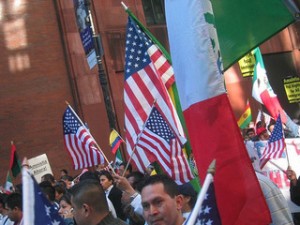The Latino Paradox: Tradition vs Identity
 It’s not surprising to me to see disconnects in political rhetoric. What is surprising is to see how readily they’re accepted and go unquestioned. Take for instance the idea that Latinos are socially conservative. I think most Latinos, given their experience and family background will agree if not attest to that fact. The influence of religion, especially of the Catholic church, has a lot to do with that traditional Latino, social, conservatism. You’ll find little argument against that idea.
It’s not surprising to me to see disconnects in political rhetoric. What is surprising is to see how readily they’re accepted and go unquestioned. Take for instance the idea that Latinos are socially conservative. I think most Latinos, given their experience and family background will agree if not attest to that fact. The influence of religion, especially of the Catholic church, has a lot to do with that traditional Latino, social, conservatism. You’ll find little argument against that idea.
Politically, though, that traditional conservative Latino idea doesn’t translate very well. Latinos consistently favor progressive ideas and candidates. So there seems to be a disconnect: liberals take it for granted, conservatives see it as a misunderstanding that needs remedy.
So take that idea and set is aside for a moment.
Now, consider the idea of Latino identity. This whole thing that Latinos have been discussing among ourselves for generations and that was recently brought to light by the Pew Hispanic Center as if it were a startling discovery: most Latinos identify by national origin and not by imposed labels.
There are some people, conservatives mostly, who would rather Latinos identify as Americans, period. No hyphens, no “other” origins. Those same people espouse traditional conservative ideas. For instance the defense of marriage. Conservatives feel that marriage should be between a man and a woman, and they believe that because that’s what the Bible tells them and because the U.S. constitution protects their right to believe it.
They also feel that because Latinos are family centered, traditional and socially conservative they have the marriage value in common (Latinos being so Catholic and all). But then a recent survey unhinged that whole ideological contraption.
The survey was done by Social Science Research Solutions, and published on the National Council of La Raza website. The study’s author, David Dutwin, PhD, said the findings were disconnected from the assumptions:
the study found that “sixty-four percent of Latinos support civil unions. No less than 83 percent of Latinos support legal protections for hate crimes, job discrimination, housing discrimination, as well as support for health care and pension benefits for gay and lesbian couples. Over three out of four (78%) support open military service.”
There’s and organization called the National Organization for Marriage (NOM) that supports traditional (man and woman only) marriage and has targeted Latinos to support their cause. NOM feels that because Latinos “identify” with traditional conservative ideas they will logically identify with them.
Now, bring back that part about Latino identity.
Keep in mind that the problem is not how Latinos chose to identify, it’s how we’re expected to do so – the choice of boxes we’re given to check. And here we are, once again, expected to think a certain way because we go to Catholic churches, and we end up behaving another.
There’s a disconnect.
Of course, the study found other factors that influence opinions about LGBT issues: whether the survey respondent knows someone who is gay, whether the the priest or preacher at the respondent’s church pounds the pulpit with anti-gay ideas…
What’s interesting is where these two ideas – identity and tradition – diverge. It’s not politics, it’s assimilation, or the idea of acculturation. The survey found that Latino ideas about LGBT issues fall along the same lines as the general population, but the Latino identity idea seems to be going in the opposite direction – we hyphenate our identity. There’s an apparent disconnect, no?
This is what drives political strategists crazy: Latinos are comfortable in the paradox.
[Phot by Kevin Coles]
